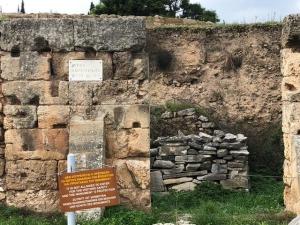
Scripture: Jeremiah, chapters 33-34; Psalm 74; 1 John, chapter 5
Jeremiah 33:1-3 (NASB) – Then the word of the Lord came to Jeremiah the second time, while he was still confined in the courtyard of the guard, saying, “This is what the Lord says, He who made the earth, the Lord who formed it to create it, He whose name is the Lord: ‘Call to Me and I will answer you, and I will tell you great and mighty things, which you do not know.’”
Observations: As I read this passage today, one phrase stood out: The word of the Lord came to Jeremiah the second time, while he was still confined in the courtyard of the guard… I think that’s probably a big “whoa” moment for a lot of people. Why is Jeremiah confined in the courtyard of the guard if God is speaking to him? If God is speaking through him? Wouldn’t it give Jeremiah’s claim to speak on the Lord’s behalf more authority if he weren’t locked up?
Well, Jeremiah has already prophesied enough – and been right often enough – that people shouldn’t need any more confirmation. Nebuchadnezzar had come the first time, and carried off many of the people of Jerusalem and Judah. He had installed Zedekiah as the puppet king of Judah. But then Zedekiah rebelled, and now the armies were back, laying siege to Jerusalem. The message that Jeremiah gives to Zedekiah in chapter 34 confirms that he too will be captured, and the city will ultimately be destroyed. To ease the sting of that prophecy just a little, God tells Jeremiah that Zedekiah would not die by the sword, but would die in peace (see 34:4-5).
So Zedekiah, who has ignored God’s commands and gone his own way, will die in peace, but Jeremiah is still confined in the courtyard of the guard. That doesn’t seem right to us – because we continually confuse God’s priorities and God’s purposes. God’s priority is simple: to prepare us for eternity in His kingdom. If that preparation requires physical suffering here, God is prepared to use our suffering for our spiritual good. Jesus told us not to fear those who can kill the body but not touch our soul; this clearly indicates that God’s priority is our spiritual life, not our physical comfort.
Our reading from Psalm 74 today is entitled, “An Appeal Against the Devastation of the Land by the Enemy.” The language of the psalm resembles the description of the siege of Jerusalem in Jeremiah, and the prayer certainly sounds like it came from that time. “The enemy has damaged everything in the sanctuary. Your adversaries have roared in the midst of Your meeting place; they have set up their own signs as signs” (Psalm 74:3b-4, NASB).
I imagine that Jeremiah’s ultimate response to God sounded a lot like that of the psalmist. “Yet God is my King from long ago, who performs acts of salvation in the midst of the earth…Remember, Lord, that this enemy has taunted You, and a foolish people has treated Your name disrespectfully…Consider the covenant; for the dark places of the land are full of the places of violence. May the oppressed person not return dishonored; may the afflicted and the needy praise Your name” (Psalm 74:12, 18, 21).
And God did remember, and He restored His people just as He promised.
Application: I think we struggle with an issue that the Israelites also struggled with: if God is our God, why are we suffering? Or, as the title of one book put it, “Why do bad things happen to good people?”
The answer, of course, is that God’s priorities are on our eternal spiritual life, not our earthly physical life. In the theological “stream” that I swim in, we don’t believe that God usually causes bad things to happen to people. Most “bad” things are the result of the broken and polluted nature of our world, which in turn results from sinful choices. Those choices have been going on throughout history, but some of them are our own sinful choices. Experiencing the consequences of those choices helps us to learn to stop making them.
That doesn’t mean that God enjoys our pain and suffering, any more than we do. He loves us. The phrase “this is going to hurt me more than it hurts you” comes to my mind. God doesn’t enjoy watching us suffer, but as C.S. Lewis wrote, pain is God’s megaphone; sometimes he uses it to shout at us when nothing else will get our attention. But in the midst of it all, we need to remember that God will not forget His people. In the end, He will triumph, and He will welcome us into His eternal Kingdom. Our focus needs to be on what God is doing today to prepare us for that Kingdom – and to actively participate in His work.
Prayer: Father, thank you for reminding us today that even when we are “still confined in the courtyard of the guard, You are at work for our good. We know that You are good, and Your mercy endures forever. Bless us today with Your presence. Help us to recognize how You are working to form the character of Jesus Christ in us, and to willingly participate in that work. Help us to live according to Your will, that Your kingdom may come in ever increasing measure. Amen.












